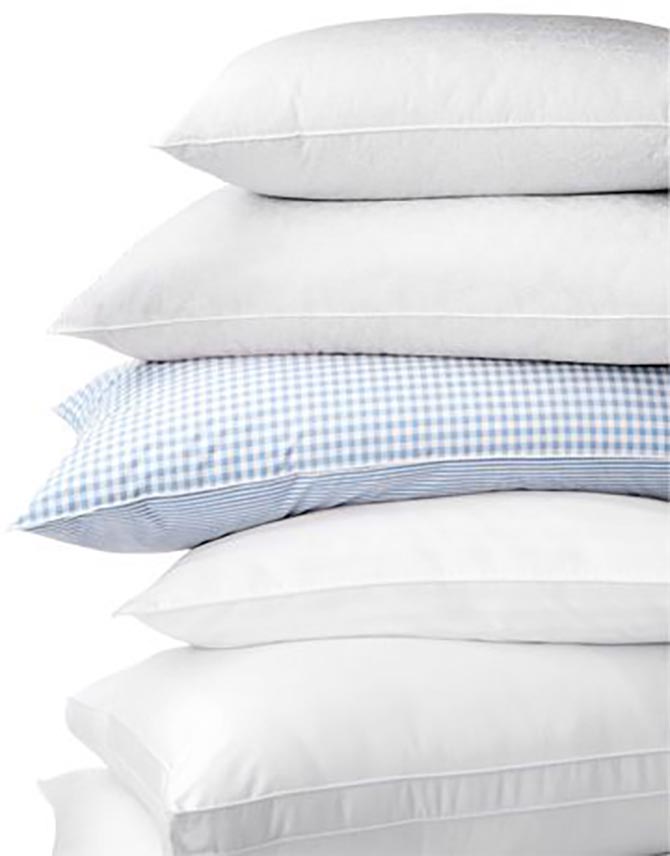7 Tips for Selecting the Perfect Pillow for a Good Night’s Sleep
Do you want to get a good night’s sleep? It all starts with the right pillow. The ideal cushion should give comfort and support while reducing neck pain and tension headaches. But how can you know which is the best choice?
The market is flooded with pillows of all forms, sizes, fabrics, and fillings – it might be overwhelming. To help you, we’ve compiled seven tips for selecting the perfect pillow for a good night’s sleep. From understanding your sleeping position and allergies to considering temperature control features – here are our top tips.
1. Consider Your Sleeping Position.
The easiest way to get the finest pillow is to consider your sleeping posture. For example, if you sleep on your back, opt for a small, low-loft pillow that won’t elevate or lower your neck from its natural posture.

On the other hand, side sleepers should opt for a thicker and firmer cushion to support their head and neck. Choosing a pillow designed for you and your sleeping habits will help maintain a neutral alignment of the spine, neck, and head. With the correct support, you can reduce neck and back pain.
2. Choose the Right Material for You
Choosing the proper material for your mattress may sometimes make or break a good night’s sleep. Do you enjoy a soft, cuddly sensation? Maybe down feathers are the way to go. Or do you need something a bit more supportive? Memory foam might be your new best friend.
The secret is determining which material will provide you with the support and comfort you require for the best possible sleep. So, carefully consider your tastes before choosing, and you’ll soon be dozing off.
3. Look at the Pillow’s Shape and Size
Consider a pillow’s shape and size before choosing one. Not every pillow is made equally. Standard-sized pillows may be the most suitable option if you commonly sleep on your back. However, contoured pillows will become your greatest friend if you prefer sleeping on your side.
They can support your neck and shoulders, preventing stiffness and pain. Last but not least, double-check sizes before clicking the checkout button. You don’t want a pillow that is too big or small for your bed.
4. Find a Pillow With the Right Amount of Firmness
Have you ever had difficulties sleeping because your pillow was too hard or too soft? It’s a common issue that might disrupt your sleep. Fortunately, selecting the proper pillow firmness is simpler than you would think.

The sort of fill used in the pillow is an important issue. Make sure it’s neither too solid nor soft but rather pleasant and supporting when you rest your head on it. You’ll get a better night’s sleep if you take the time to locate the proper level of firmness in a pillow.
5. Consider Breathability When Selecting a Pillow
There’s more to choosing the perfect pillow than what feels the most comfy. Breathability is critical if you want to stay cool and comfy all night. You should look for a pillow with highly breathable materials like latex or gel foam.
These materials will aid in regulating temperature as you sleep and save you from overheating. On the other hand, memory foam is less airy and may cause you to feel hot while sleeping.
6. Ensure Temperature Control Features Are Available
If you become hot when sleeping, temperature control features are essential while shopping for bedding or pillows. They may appear a luxury, but trust me when I say they are worth it for a good night’s sleep.
Choose textiles with moisture-wicking characteristics to keep you cool and dry. Pillows packed with cooling beads or gels are another excellent choice. Don’t settle for a night of tossing and turning due to overheating – invest in temperature control features to stay cool and get some quality rest.
7. Look For Hypoallergenic Pillows if You Have Allergies
You must choose a hypoallergenic pillow if you suffer from allergies. Natural materials like down, feathers, and cotton fill hypoallergenic cushions. They are also breathable to keep you cool and won’t aggravate skin conditions like allergies.
Look for hypoallergenic polyester or microfiber pillows if you prefer man-made fabrics. You can sleep peacefully without crying or itchy eyes if you avoid allergen-rich materials like latex.
Conclusion
Choosing the perfect pillow for a good night’s sleep can be tricky, but with these seven tips in mind, you should have no problem finding one that works best for your needs.
From firmness to material and support level, consider all the factors involved when shopping around so you can enjoy restful nights without tossing and turning. With the right pillow selection, getting an incredible night’s sleep will be easier than ever. Happy shopping!



